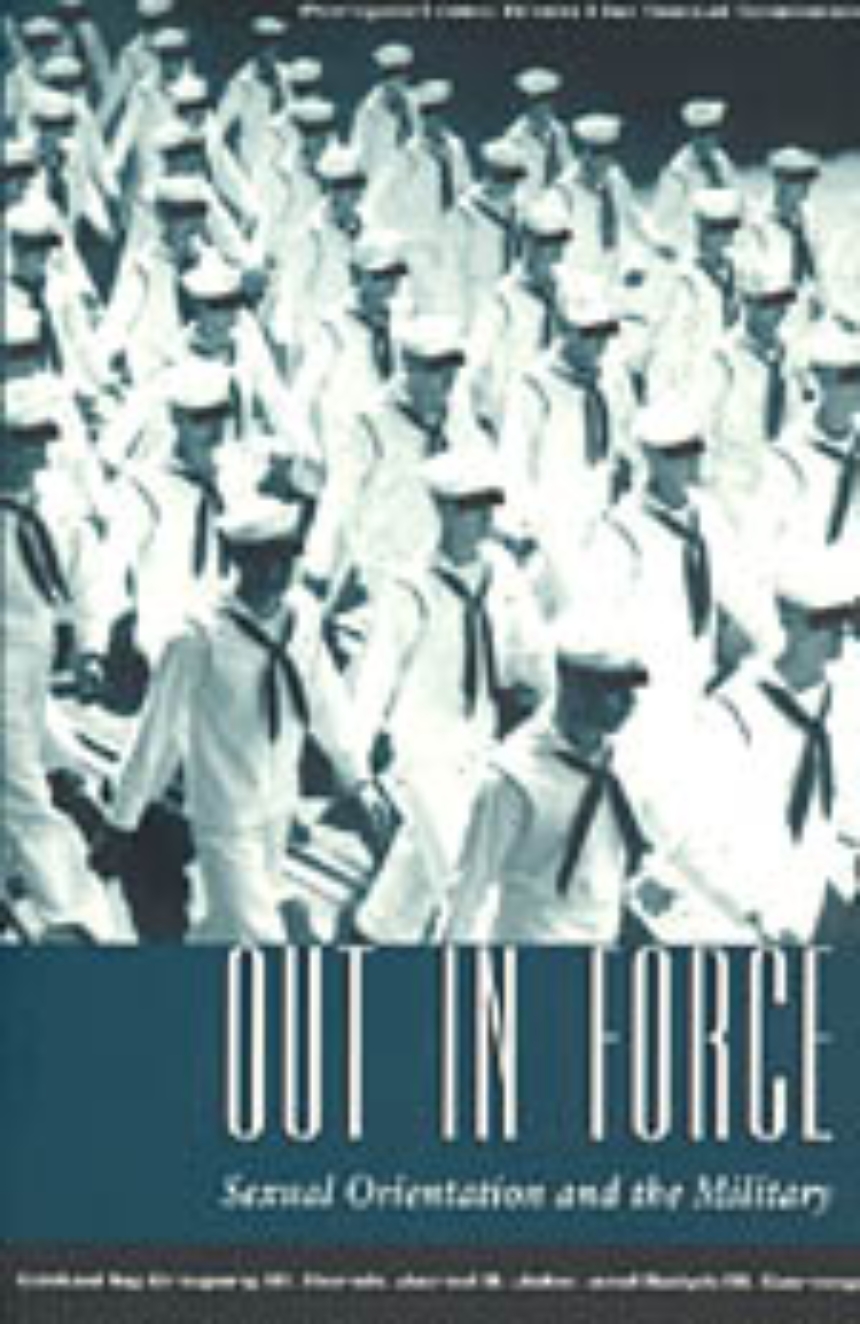Out in Force
Sexual Orientation and the Military
Can the U.S. military integrate gay personnel into its ranks and still accomplish its mission? In 1993, this question became the center of a heated debate when President Clinton attempted to lift the long-standing ban on gays in the military. This debate persists because the compromise policy "Don’t Ask, Don’t Tell, Don’t Pursue," faces serious legal challenges, and is likely to go to the Supreme Court before the end of the decade. Just below the surface of this debate rages a more general argument about the status of gay people in America.
Both sides base their views on assumptions about the consequences of integration. Even defenders of the ban grudgingly acknowledge that homosexuals are fully capable of serving with distinction. Few question gay service members’ abilities or patriotism; justifications for the ban are now predicated on heterosexuals’ negative reactions.
Out in Force refutes the notions that homosexuality is incompatible with military service and that gay personnel would undermine order and discipline. Leading social science scholars of sexual orientation and the military offer reasoned and comprehensive discussions about military organizations, human sexuality, and attitudes toward individuals and groups. They demonstrate forcefully that the debate is really about the military as an institution, and how that institution will adapt to larger social changes. The contributors show that the ban could be successfully eliminated, and set forth a program for implementation. In sorting opinion from fact, myth from reality, Out in Force stands as an invaluable guide for the military, lawmakers, and the courts as they continue to grapple with this question of institutional and societal change.
Both sides base their views on assumptions about the consequences of integration. Even defenders of the ban grudgingly acknowledge that homosexuals are fully capable of serving with distinction. Few question gay service members’ abilities or patriotism; justifications for the ban are now predicated on heterosexuals’ negative reactions.
Out in Force refutes the notions that homosexuality is incompatible with military service and that gay personnel would undermine order and discipline. Leading social science scholars of sexual orientation and the military offer reasoned and comprehensive discussions about military organizations, human sexuality, and attitudes toward individuals and groups. They demonstrate forcefully that the debate is really about the military as an institution, and how that institution will adapt to larger social changes. The contributors show that the ban could be successfully eliminated, and set forth a program for implementation. In sorting opinion from fact, myth from reality, Out in Force stands as an invaluable guide for the military, lawmakers, and the courts as they continue to grapple with this question of institutional and societal change.
352 pages | 8 tables, 3 line drawings | 6 x 9 | © 1996
Worlds of Desire: The Chicago Series on Sexuality, Gender, and Culture
Political Science: Public Policy
Table of Contents
Preface
1: Social Science, Sexual Orientation, and Military Personnel Policy
Gregory M. Herek
2: Sexual Orientation and Proscribed Sexual Behaviors
Janet Lever, David E. Kanouse.
3: Sexual Orientation and the Military: Some Legal Considerations
Peter D. Jacobson
4: Integration of Women in the Military: Parallels to the Progress of Homosexuals?
Patricia J. Thomas, Marie D. Thomas.
5: Applying Lessons Learned from Minority Integration in the Military
Michael R. Kauth, Dan Landis.
6: The Experience of Foreign Militaries
Paul A. Gade, David R. Segal, Edgar M. Johnson.
7: Lessons Learned from the Experience of Domestic Police and Fire Departments
Paul Koegel
8: Sexual Orientation and Military Cohesion: A Critical Review of the Evidence
Robert J. MacCoun
9: The Deconstruction of Stereotypes: Homosexuals and Military Policy
Theodore R. Sarbin
10: Why Tell If You’re Not Asked? Self-Disclosure, Intergroup Contact, and Heterosexuals’ Attitudes Toward Lesbians and Gay Men
Gregory M. Herek
11: Sexual Modesty, the Etiquette of Disregard, and the Question of Gays and Lesbians in the Military
Lois Shawver
12: Issues of Confidentiality: Therapists, Chaplains, and Health Care Providers
Jeffrey E. Barnett, Timothy B. Jeffrey.
13: Implementing Policy Changes in Large Organizations: The Case of Gays and Lesbians in the Military
Gail L. Zellman
14: The President, the Congress, and the Pentagon: Obstacles to Implementing the "Don’t Ask, Don’t Tell" Policy
Lawrence J. Korb
Conclusion
Gregory M. Herek, Jared B. Jobe, Ralph M. Carney.
About the Contributors
Index
1: Social Science, Sexual Orientation, and Military Personnel Policy
Gregory M. Herek
2: Sexual Orientation and Proscribed Sexual Behaviors
Janet Lever, David E. Kanouse.
3: Sexual Orientation and the Military: Some Legal Considerations
Peter D. Jacobson
4: Integration of Women in the Military: Parallels to the Progress of Homosexuals?
Patricia J. Thomas, Marie D. Thomas.
5: Applying Lessons Learned from Minority Integration in the Military
Michael R. Kauth, Dan Landis.
6: The Experience of Foreign Militaries
Paul A. Gade, David R. Segal, Edgar M. Johnson.
7: Lessons Learned from the Experience of Domestic Police and Fire Departments
Paul Koegel
8: Sexual Orientation and Military Cohesion: A Critical Review of the Evidence
Robert J. MacCoun
9: The Deconstruction of Stereotypes: Homosexuals and Military Policy
Theodore R. Sarbin
10: Why Tell If You’re Not Asked? Self-Disclosure, Intergroup Contact, and Heterosexuals’ Attitudes Toward Lesbians and Gay Men
Gregory M. Herek
11: Sexual Modesty, the Etiquette of Disregard, and the Question of Gays and Lesbians in the Military
Lois Shawver
12: Issues of Confidentiality: Therapists, Chaplains, and Health Care Providers
Jeffrey E. Barnett, Timothy B. Jeffrey.
13: Implementing Policy Changes in Large Organizations: The Case of Gays and Lesbians in the Military
Gail L. Zellman
14: The President, the Congress, and the Pentagon: Obstacles to Implementing the "Don’t Ask, Don’t Tell" Policy
Lawrence J. Korb
Conclusion
Gregory M. Herek, Jared B. Jobe, Ralph M. Carney.
About the Contributors
Index
